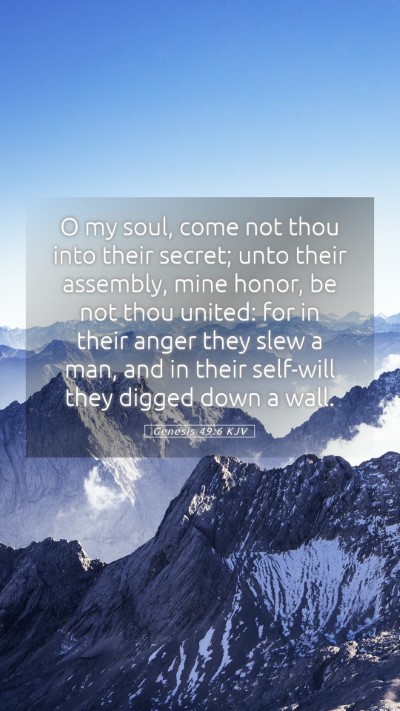Understanding Genesis 49:6
The verse Genesis 49:6 states: "O my soul, come not thou into their secret; unto their assembly, mine honor, be not thou united: for in their anger they slew a man, and in their selfwill they digged down a wall." This verse comes from the context of Jacob's blessings to his sons, particularly focusing on the character and actions of Simeon and Levi.
Overview of Genesis 49:6
In this eloquent declaration, Jacob expresses his abhorrence for the violent deeds committed by his sons, Simeon and Levi. Through a profound sense of familial loyalty, he repels any association with their acts of vengeance, highlighting the severity of their actions.
Commentary Highlights
-
Matthew Henry's Commentary:
Henry emphasizes the gravity of the actions performed by Simeon and Levi in their slaughter of the Shechemites, directed by a vengeful heart rather than righteous zeal. Jacob's response serves as a pronounced moral position encouraging family honor while avoiding disgrace through association with violence.
-
Albert Barnes' Notes:
Barnes sheds light on the consequences of their actions, indicating that the curse from Jacob reflects not only the immediate wrongdoing but also serves as forewarning to future generations. His detachment underscores a father’s role in guiding his sons towards righteousness and reconciliation.
-
Adam Clarke's Commentary:
Clarke elaborates on the societal and spiritual implications of the brothers' violence, noting that Jacob's separation signifies a rejection of their violent behavior. He underscores that the 'wall' metaphorically represents the defenses of unity and faith that were torn down by anger and revenge.
Biblical Exegesis
To interpret Genesis 49:6 accurately, it’s important to consider the historical and cultural context. Jacob's words reflect a long-standing feud and encapsulate the consequences of unchecked emotions leading to violent acts. This passage serves as a solemn reminder of the importance of temperance and righteousness within familial and communal relationships.
Importance of Family and Honor
Jacob's statement embodies the timeless principle that integrity and family honor should take precedence over vengeful impulses. This critical reflection prompts serious consideration about how one’s actions affect both personal and communal integrity.
Application of Genesis 49:6 in Daily Life
The warnings contained within this verse encourage individuals to reflect on their own actions and attitudes, particularly in situations involving conflict and anger. Abiding by values of peace, patience, and reconciliation can lead to healthier relationships and societal peace.
Cross-References
- Genesis 34:25-31: This passage details the events that led to the wrath of Simeon and Levi after Dinah was violated.
- Deuteronomy 33:8-11: Here, Moses blesses the tribes, illustrating their attributes and fates stemming from their historical actions.
- Matthew 5:9: Jesus emphasizes peace-making, aligning with the central message of Genesis 49:6 that values peaceful reconciliation over violence.
Final Thoughts
Genesis 49:6 invites us into a deeper understanding of familial loyalty, accountability, and the serious repercussions of violence. Through careful scripture analysis and interpretation, we glean vital lessons about our ethical responsibilities and the true meaning of honor within our lives.
Resources for Further Study
For those seeking to delve deeper into Bible verse meanings and Bible study insights, consider using online Bible study tools and guides:
- Explore Bible study resources that provide context and interpretations.
- Join Bible study groups for collective understanding and discussion.
- Engage with Bible study courses that may offer in-depth analysis of scripture passages.


